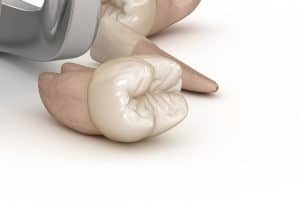 Once you’ve been told that you have to extract a tooth, the need for it is unavoidable. Unlike many other dental treatments, tooth extraction is a last resort that’s meant to preserve the rest of your oral health when a tooth can’t be saved. However, many of the conditions that lead to the need for tooth extraction can be prevented, or treated in their earlier stages, while the tooth still has a good chance of being fully restored. Today, we examine a few such conditions, and how to manage them to avoid having to extract the tooth in the future.
Once you’ve been told that you have to extract a tooth, the need for it is unavoidable. Unlike many other dental treatments, tooth extraction is a last resort that’s meant to preserve the rest of your oral health when a tooth can’t be saved. However, many of the conditions that lead to the need for tooth extraction can be prevented, or treated in their earlier stages, while the tooth still has a good chance of being fully restored. Today, we examine a few such conditions, and how to manage them to avoid having to extract the tooth in the future.
When extracting a tooth is the only option
Sometimes, the need for tooth extraction can be unavoidable. For example, if one or more of your wisdom teeth become impacted as they try to erupt through your dental ridge, then you may have to extract them to avoid significant damage to the bone structure and your other teeth. However, a tooth might also need to be extracted if it has become so severely infected with tooth decay that most of its natural structure is gone. The infection inside of the tooth can also pose a threat to your oral health, making tooth extraction even more important. The same may be true for an extremely damaged tooth, or one that has lost much of its support due to severe gum disease.
Treating a tooth before extraction is necessary
If your tooth has become decayed, then treating the cavity that develops as early as possible is the best way to mitigate the damage it can cause to your tooth structure. For example, a tooth-colored filling can be placed in the cavity after it’s been thoroughly cleaned and the infected tooth tissue removed. Even in severe cases of tooth infection, the tooth might still be saved with a more involved root canal procedure, during which we can remove the infected tooth tissues from within the tooth’s inner chambers and restore its compromised tooth structure.
How to avoid needing to extract another tooth
Whether it’s treating a tooth infection or restoring a damaged tooth, doing so as soon as possible is the best way to prevent the condition from leading to the need for tooth extraction. Such conditions are progressive, and because your tooth structure can’t heal on its own, they will only grow more severe without intervention. If tooth extraction does become necessary, then the loss of the tooth may also increase your oral health risks in the future if not addressed. For this reason, we may recommend placing a custom-designed restoration to replace the tooth immediately after it’s been extracted.
Learn if you can avoid tooth extraction
Tooth extraction is typically reserved for severe tooth problems, which means you may have a good chance of avoiding it before your condition becomes that serious. To learn more, schedule an appointment with us by calling Dreem Dentistry in Leawood, KS, today at 913-681-5500.






